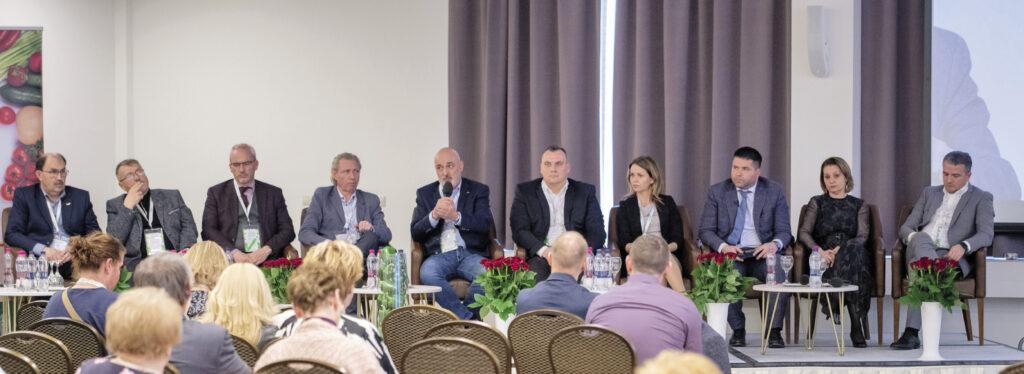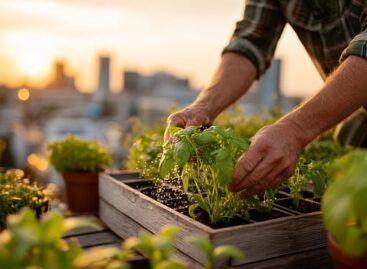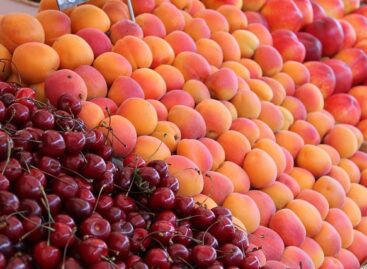Money taps are to be turned on in horticulture
For the ninth time, on 29 February horticulturist met to discuss the latest issues affecting the sector at the Zsendülés conference.
This article is available for reading in Trade magazin 2024/4
József Rácz, president of the organiser Kert-Ész Klub Magyarország Association, welcomed the 200 participants.
Brief reports from the different sectors
Dr Ferenc Apáti, president of the FruitVeb Hungarian Interprofessional Organisation for Fruit and Vegetable was the first speaker. He told that production costs have grown by roughly 50% in greenhouse tomato production since the last “peace year” in 2020. He stressed that the sector mustn’t go overboard, as the market reaction to overpricing will be shifting to imports.

From the labour market to the tendering system, the first round table discussion covered a number of “hot” topics
Will 2024 be a year of investment or savings? This was the question Gergő Soltész – economist, chairman and owner of Ostorosbor Winery Zrt., and member of the board of Takarék Jelzálogbank Nyrt. – asked. He admitted that he doesn’t know the answer, as it is very difficult to maintain an over-pressured economy, because external factors have become much more unfavourable. The way out may be to boost productivity.
Sándor Baja, managing director of Randstad Hungary Kft. summarised the latest developments in the Hungarian labour market. According to their recent survey, Hungarian executives are primarily concerned about managing labour costs. The majority of companies are thinking of a 6-10% pay rise this year, with no company planning to raise salaries above 20%. Sándor Farkas, deputy minister of the Ministry of Agriculture reviewed current issues in the sector. He told that last year the fruit and vegetable sector accounted for 13% of agricultural output, thanks to targeted funding. About the grant programmes to be launched in the spring, the deputy minister told this year there will be 64 of these for agri-businesses, with a budget of HUF 50bn. Gergely Papp, deputy director general of the Hungarian Chamber of Agriculture (NAK) and Zoltán Gubacsi, member of Kert-Ész Klub Magyarország Association and managing director of Délplant Kft. joined the speakers in the first roundtable discussion.
We go too far
The second block of the Zsendülés conference focused on stress factors. Collapse researcher Balázs Stumpf-Bíró spoke about the global polycrisis. He revealed that year after year the Earth Overshoot Day (the day when human consumption exceeds the level that the Earth can replenish in a year) is reached earlier.

„We must do whatever is up to us” – that was the message of the second roundtable
Dr Ferenc Kaiser, associate professor of the National University of Public Service analysed the influence of the world’s geopolitical conflicts on Europe and the Hungarian economy. Levente Suba, head of sustainability at K&H Group spoke about the ESG expectations of fruit and vegetable producers. He emphasised that companies now have to pay more attention to the environmental and social impacts of their operations. Boris Rebrik, founder-director of Rebrik Vineyards from Ukraine spoke about grape breeding. He told how Ukraine has gone from almost nothing to becoming the world’s leading grape growing country. In the roundtable discussion Andrea Nemes-Nagyné Vas, managing director of Trivega Kft. joined the speakers.
Trade is also moving towards concentration
After lunch the fruit and vegetable trade was discussed. Dr Márton Pál Nobilis, secretary of state responsible for the food industry and trade policy of the Ministry of Agriculture underlined: the introduction of sustainable production practices not only serves to protect the environment, but can also bring long-term economic benefits. As for sales, he pointed out that retail chains have a dominant market share and the volume of imports is significant. Tünde Turcsán, managing director of Consumer Panel Hungary talked about consumption trends. She said that the drastic change in price levels in the last 2 years has had a big influence on monthly household spending: Hungarians shop more often, the value of the shopping basket has become smaller, and people buy certain product categories less often.

The key to a stronger presence of Hungarian fruits and vegetables in the shops is to make them available to the trade as early as possible and in as consistent quality and quantity as possible, speakers at the third round table discussion agreed
Eszter Benedek, managing director of Hungarian Product Nonprofit Kft. explained the sales benefits of using the Hungarian Product trademark. According to representative survey, 71% of consumers trust the origin of products certified by the trademark. Currently there are 251 member companies with 5,515 trademarked products, and more than 80% of these are food. Zoltán Ujszászi, head buyer of fruit and vegetables at Tisza-COOP Zrt. introduced the integration efforts of fruit and vegetable procurement in the COOP network. It was 3 years ago that Tisza-COOP began delivering fruit and vegetables from their state-of-the-art 6,000m² refrigerated central warehouse in Szolnok, which opened in 2020. Work in this block also ended with a roundtable discussion, where the speakers were joined by more experts.

The closing session of the conference focused on effective negotiation strategies
In the last part of the programme András Moldován, pork mogul, start-upper and investor gave a presentation, titled “Be the best version of yourself”. The conference ended with a Gala Dinner and the presentation of the Zsendülés Awards. //
Award winners
This year’s Zsendülés Award winners:
Forcing horticulturist: Péter Mihály, Üllés;
Young horticulturist: Renátó and Dorián Zákány, Felgyő;
Grape grower and winemaker: Ostoros Family Winery, Eger;
Orchardist: Rebrik Boris, Csepe;
Innovative horticulturist: Attila Gyuris, Zsombó;
Lifetime achievement award (grower): Jenő Müller, Kecskemét //
Related news
A stable compass in the Hungarian FMCG sector for 20 years
🎧 Hallgasd a cikket: Lejátszás Szünet Folytatás Leállítás Nyelv: Auto…
Read more >In 2025, FruitVeB considered the support and professional coordination of the TÉSZs as its priority task
🎧 Hallgasd a cikket: Lejátszás Szünet Folytatás Leállítás Nyelv: Auto…
Read more >Frost damage devastated last year’s fruit crop
🎧 Hallgasd a cikket: Lejátszás Szünet Folytatás Leállítás Nyelv: Auto…
Read more >Related news
Where wheat turns into flour and data: this is how the domestic milling industry is digitizing
🎧 Hallgasd a cikket: Lejátszás Szünet Folytatás Leállítás Nyelv: Auto…
Read more >High-protein products are taking over
🎧 Hallgasd a cikket: Lejátszás Szünet Folytatás Leállítás Nyelv: Auto…
Read more >









